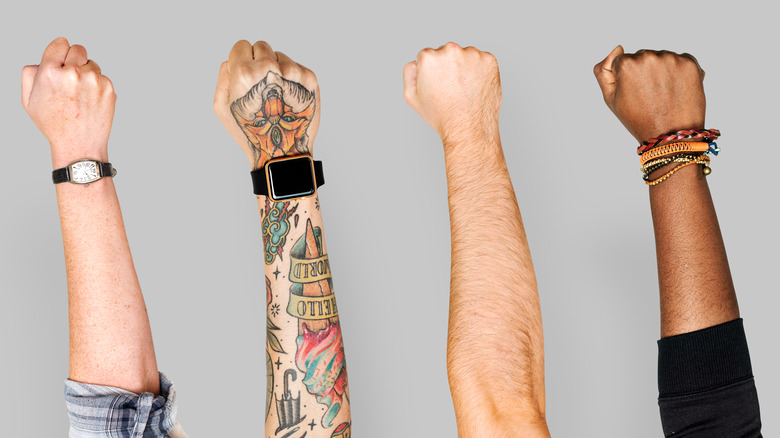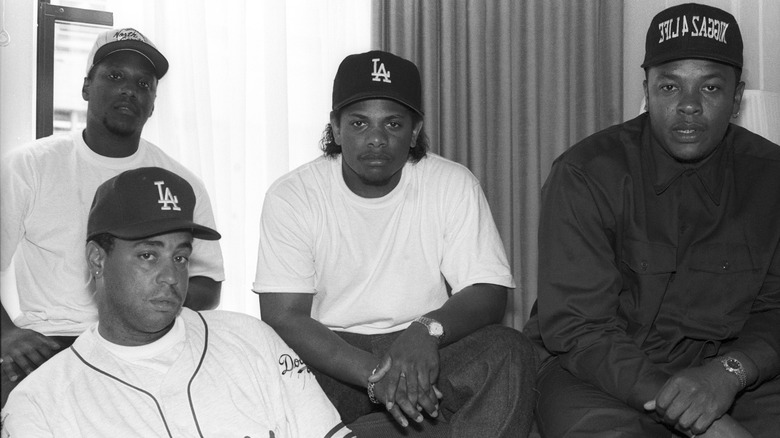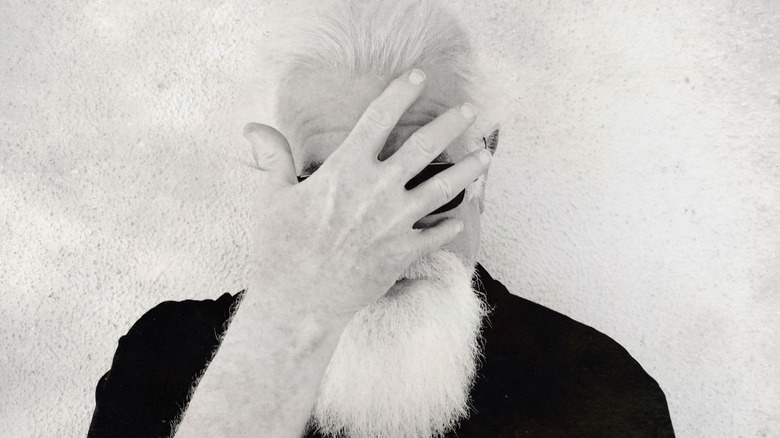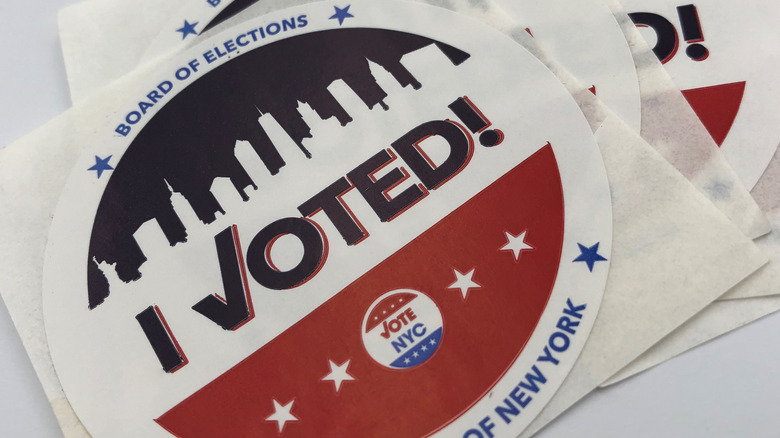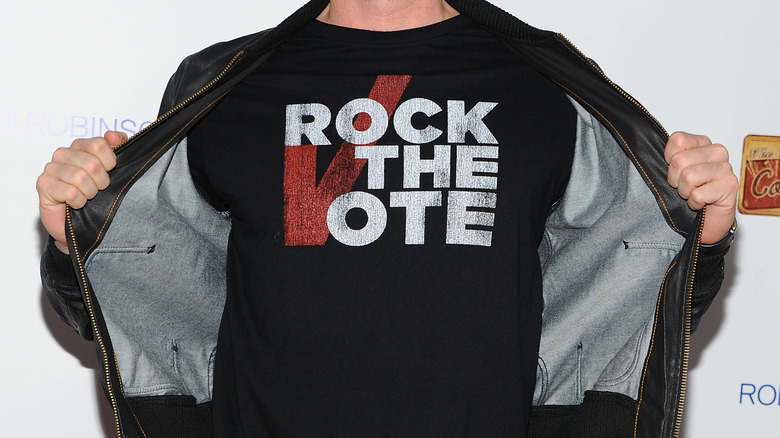Why Was Rock The Vote Created And Who Founded It?
Ah, the '90s. A time of flannel and grunge-chic dress-up in the spirit of Kurt Cobain, discman-bearing teens brooding in bedroom pits arrayed in band posters, and the telltale internet dial-up sound preempting the use of the telephone for the next couple of hours. MTV was cool, and youth culture rode high atop it. Shows like "Road Rules," "MTV Jams," "120 Minutes," and "Beavis and Butthead" made the rules, and the young gladly adhered.
In response, as early as 1985, the Parents Music Resource Center (PMRC) lobbied government to placate legions of parents with then-controversial "parental advisory" stickers, per Hip Hop Hero. Debates about the stickers dragged on till 1994, even down to their Congress-guided design, per NPR. Such mandatory measures assured that parents could profusely object when their son or daughter heard one of those naughty, naughty "f" words. They also guaranteed more and more rebellion from the music-buying public, musicians, and other involved parties.
Enter Jeff Ayeroff, then executive at Virgin Records. Ayeroff slipped through the ranks of the censorship police and tried to transform the whole parental advisory brouhaha into something pro-social. According to Pitchfork, he was sick of "conservatives weaponizing popular music" and wanted to do something about it. If kids didn't like what government was doing, he figured, and didn't want all those dumb, pesky rules, they had to step up. They had to promote change. They had to vote. That's why in 1990, Averoff founded the bipartisan nonprofit Rock the Vote.
Parental advisory: explicit content
It's a pretty simple concept, really. How do you get a disengaged, disinterested public involved in the democratic process? Make voting cool. Make it anthemic. Make it about something folks actually care about: music. And perhaps most importantly, make it appeal to those with money and without. But to understand precisely how momentous and important the whole Rock the Vote movement was, it pays to get a deeper sense of the times.
At the time, a whole confluence of events led to the rise of scrutinizing song lyrics. Nowadays, it seems paltry and irrelevant to see an "explicit content" warning on an album or even on an individually streamable song. But back when Beach Boy Mike Love — yes, the musician — created the non-profit Parents Music Resource Center (PMRC) in 1985, agenda-driven politicians jumped all over it, as NPR describes. With Tipper Gore at the head and her daughter tipping her off about gasp-worthy masturbation references in Prince's "Darling Nikki," Gore and the PMRC created a list of 15 "porn rock" tracks that they felt typified the corruption of the young. The list included artists like Madonna, AC/DC, Twisted Sister, and more, per Culture Trip.
Around this same time, hip-hop legends N.W.A. exploded in popularity. Rap, deliberately explicit to convey the realities of urban life, made an easy target. Come 1990, the first legally censored album, 2 Live Crew's aptly-named "Banned in the U.S.A.," came out.
The man behind the movement
If stickers on CDs were the most that the PMRC could muster, Rock the Vote might never have happened. But in June 1990, one month after "Banned in the U.S.A." came out, an undercover cop walked into a Fort Lauderdale record story, bought a copy of 2 Live Crew's "As Nasty as They Wanna Be," and arrested the employee who'd sold it (via Pitchfork). Three days later, police in Hollywood, Florida, stopped at a 2 Live Crew performance and arrested two of its members, Luther Campbell and Chris Won Wong, for "certain acts in connection with an obscene, lewd performance." They were acquitted and released, but this wound up being a tipping point in the culture wars.
We've got Jeff Ayeroff to thank for taking things from here. As a creative and executive at A&M Records, Warner Records, and Virgin, he despised the PMRC and its mission. He'd worked directly with some of the artists on PMRC's "porn rock" list — including Prince and Madonna — and also on iconic, MTV-aired 80s music videos like the Police's "Every Breath You Take." A well-connected guy, he reached out to MTV founder Tom Freston and pitched an idea. "The reality is, the big stars, we don't make [them] — we just turn them onto things and put the money behind them," Ayeroff told Pitchfork. "The same idea applies to politics, to getting kids to vote. If I can market Madonna, Prince, and the Talking Heads, I can market voting."
Spreading the Madonna-led word
By the time Jeff Ayeroff contacted MTV's Tom Freston, the PMRC was already turning its moralizing eye to MTV, including the "exceptional savagery" of its metal videos, as Pitchfork cites. Ayeroff's idea — to use musicians to leverage MTV's young audience into helping ensure the protection of artistic expression — worked for everyone: MTV, record labels, the music-buying public, etc. "For the first time ever in the world, there was one radio station, and it just so happened to be on television," Ayeroff said at the time (via Pitchfork). "Kids all over the country would see the same program, see the same videos, hear the same interviews. They would watch the same commercials."
Ayeroff and friends wasted no time. The same year as 2 Live Crew's parental advisory-stickered album "Banned in the U.S.A." came out and two of its group members were arrested, Ayeroff founded Rock the Vote. While the iron was hot, Ayeroff worked with his assistant Beverly Lund and his partner at Virgin Jordan Harris to build a non-profit, censorship-opposed counter to PMRC, focused on voters aged 18 to 29. Ayeroff tapped Madonna and Lenny Kravitz to make video spots promoting Rock the Vote, and Madonna stepped up in a big way. As we can see on YouTube, she crafted a perfectly on-brand, casually-shot, lightly risqué spoof of her hit song, "Vogue" — changed to "Vote" — complete with two off-rhythm dancers and herself in bright-red underwear. Freston told Pitchfork that MTV played it "all day long."
Going global
Lest the cynics in the crowd declare that a Madonna-led PSA constitutes nothing more than a self-indulgent artist stepping out of her lane, Rock the Vote had real history-changing consequences. More to the point, Rock the Vote illustrates the importance not only of involving everyone in mechanisms of government but also of ensuring that everyone is involved, period, including artists themselves. This was especially true leading up to the 1992 U.S. presidential election.
As Pitchfork explains, between 1990 and '92, Rock the Vote got Michael Jackson, LL Cool J, R.E.M., Aerosmith, and more on board. Metal legends Megadeth were featured in a particularly striking, completely silent ad where the rockers had tape over their mouths (watchable on YouTube). "Your vote is your voice," the promo's only line read. The message was clear: If people want to hear from musicians, vote for someone who won't silence them.
And so, during the 1992 presidential campaign, Bill Clinton made a smart move and teamed up with Rock the Vote and MTV in a televised special, "Choose or Lose: Facing the Future with Bill Clinton." Young people in T-shirts lobbed questions at Clinton, who answered everything with typical aplomb. This included topics usually off the table, like underwear preferences and Clinton's personal drug use history. Come the election, there was a 37% increase in turnout for voters 18 to 24 compared to the previous election, and Clinton won. Rock the Vote continued to grow from there and even spilled over into Mexico, as NPR shows.
A lasting legacy
Nowadays, Rock the Vote is not only going strong, but has evolved dramatically. The Rock the Vote website lists a massive leadership team and core objective of "research-driven programs and innovative solutions to right the system and ensure each youth generation is represented in our democracy." Critically, Rock the Vote is now a catch-all resource for people in every state to learn about their state's voting process, top to bottom. It still focuses on young people, and it even contains instructions for absentee ballots and those living abroad. It also hosts events directly in foreign countries to involve expat communities, as Facebook shows. And yes, musicians still help the whole thing work, as Tenacious D did in a 2022 live-stream concert.
For his part, Jeff Ayeroff has continued to bounce around the music industry and related fields. Among other things, his work on the Talking Head's album "Stop Making Sense" landed its album cover in the Museum of Modern Art, per Mentor DNA. He helped develop the careers of Fiona Apple, My Chemical Romance, Green Day, and more. He also co-founded ArtistsFirst — a marketing consultancy focused on humanitarian activism through music.
Rock the Vote is currently focusing on the 2022 U.S. midterm elections. There are volunteer opportunities, links to learn about local elected officials, and a full social media presence to explore. We might not have a new Madonna promo for inspiration, but that's no reason not to go out and rock the vote.
